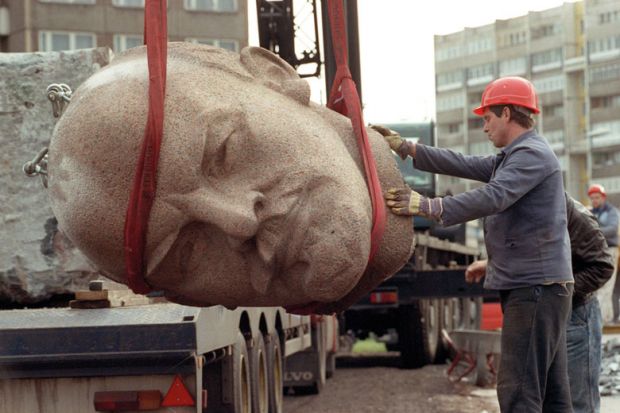Universities across North America and Europe are reporting significant declines in enrolment of first-year Russian-language students, with scholars blaming the Kremlin’s war on Ukraine.
Academics at leading Russian and Slavic studies departments told Times Higher Education that they were seeing 30 to 50 per cent declines in enrolment figures for elementary Russian.
At Yale University, enrolment in first-year Russian is 40 per cent lower this year than in the past five years. Sweden’s Lund University has seen a 40 to 50 per cent decrease from last year. Swarthmore College and Wellesley College – leading US liberal arts institutions – have both seen a 30 per cent decrease.
THE Campus views: Fake news and disinformation abounds, but what can universities do?
THE has seen reports of enrolment figures for other institutions, including the University of Kansas, the University of Tennessee and Williams College, noting declines of a similar order, although the figures were not confirmed by the institutions directly.
Meanwhile, the war appears to have given a boost to other Slavic languages, with Polish and Ukrainian making pronounced gains in some places.
Edyta Bojanowska, professor of Slavic languages and literatures at Yale, told THE that its enrolment for introductory Russian was at a six-year low as its demand for first-year Polish reached an all-time high.
“The new geopolitical situation in eastern Europe certainly opened up a unique window for such initiatives by realigning student interests. Constant media coverage of not just Ukraine but eastern Europe more broadly may have increased young people’s interest in east European languages and cultures other than Russian,” Professor Bojanowska said.
She noted that “instructors’ reports of informal conversations with students last spring indicate that Russia’s war in Ukraine made many students question their decision to study Russian, and that this decision has acquired an ethical dimension”.
Professor Bojanowska said she hoped that Yale might add in-person Ukrainian teaching if interest continues.
This year the University of California, Berkeley is offering a Ukrainian language option for the first time. Meanwhile, the University of Alberta has more than 60 Ukrainian language students in its beginner courses – roughly double last year’s enrolment.
“For Ukrainian 101, this totals about a third of our current Russian [101] enrolments, no small feat considering the novelty of the programme,” said David Kurkovskiy, a graduate student teaching the Russian course.
Scholars at two UK institutions with major offerings in these areas – the University of Oxford and Durham University – said it was too early to count their student figures.
“In the past, bad news for the region has indeed usually been followed by a rise in student interest in the course,” said Nicolette Makovicky, director of Oxford’s Russian and east European studies programme.
She added that the war in Ukraine was already affecting academia in other ways.
“I already get a sense that the war is speeding up a ‘decolonising’ of Russian history and studies,” said Dr Makovicky, noting “greater interest in what might have formerly been seen as the margins of the USSR”, including the Caucasus and Central Asia, and a “re-evaluation of the relationship between the periphery and centre”.
后记
Print headline: Amid war, Russian 101 enrolments plummet at Western institutions




